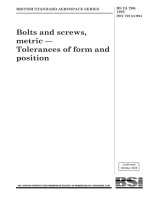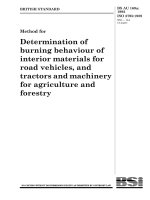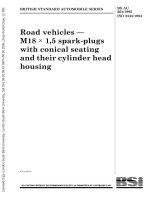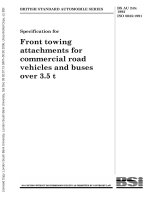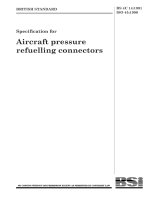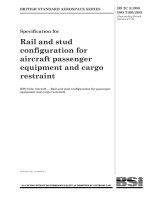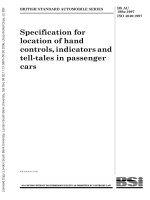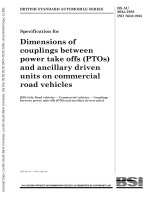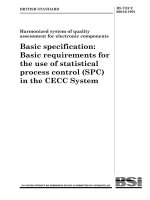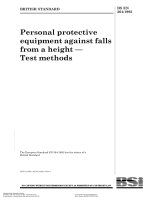Bsi bs en 23270 1991 (1999) iso 3270 1984
Bạn đang xem bản rút gọn của tài liệu. Xem và tải ngay bản đầy đủ của tài liệu tại đây (247.67 KB, 10 trang )
BRITISH STANDARD
Specification for
Temperatures and
humidities for
conditioning and
testing paints,
varnishes and their raw
materials —
This European Standard EN 23270:1991 has the status of a
British Standard
BS EN
23270:1991
ISO 3270:1984
BS EN 23270:1991
Cooperating organizations
The European Committee for Standardization, under whose supervision this
European Standard was prepared, comprises the national standards
organizations of the following Western European countries.
Austria
Belgium
Denmark
Finland
France
Germany
Greece
Iceland
Ireland
Italy
Luxembourg
Netherlands
Norway
Portugal
Spain
Sweden
Switzerland
United Kingdom
This British Standard was
published under the authority
of the Standards Board and
comes into effect on
29 November 1991
© BSI 08-1999
The following BSI references
relate to the work on this
standard:
Committee reference PVC/10
Draft for comment 87/50031 DC
ISBN 0 580 20192 9
Oesterreichisches Normungsinstitut
Institut belge de normalisation
Dansk Standardiseringsraad
Suomen Standardisoimisliito, r.y.
Association franỗaise de normalisation
Deutsches Institut für Normung e.V.
Hellenic Organization for Standardization
Technological Institute of Iceland
National Standards Authority of Ireland
Ente Nazionale Italiano di Unificazione
Inspection du Travail et des Mines
Nederlands Normalisatie-instituut
Norges Standardiseringsforbund
Instituto Portugs da Qualidade
Asociación Espola de Normalización y Certificación
Standardiseringskommissionen i Sverige
Association suisse de normalisation
British Standards Institution
Amendments issued since publication
Amd. No.
Date
Comments
BS EN 23270:1991
Contents
Cooperating organizations
National foreword
Foreword
Text of EN 23270
National appendix NA (informative)
© BSI 08-1999
Page
Inside front cover
ii
2
3
Inside back cover
i
BS EN 23270:1991
National foreword
This British Standard has been prepared under the direction of the Pigments,
Paints and Varnishes Standards Policy Committee, and is the English language
version of EN 23270 “Paints and varnishes and their raw materials —
Temperatures and humidities for conditioning and testing”, published by the
European Committee for Standardization (CEN). It is identical to ISO 3270:1984
“Paints and varnishes and their raw materials — Temperatures and humidities
for conditioning and testing”, published by the International Organization for
Standardization (ISO).
ISO 3270:1984 was previously published as Annex A to BS 3900 “Methods of test
for paints” — Part 0:1989 “General introduction”. BS 3900-0 is being amended
and Annex A to that standard will be replaced by a reference to BS EN 23270.
A British Standard does not purport to include all the necessary provisions of a
contract. Users of British Standards are responsible for their correct application.
Compliance with a British Standard does not of itself confer immunity
from legal obligations.
Summary of pages
This document comprises a front cover, an inside front cover, pages i and ii,
the EN title page, pages 2 to 4, an inside back cover and back cover.
This standard has been updated (see copyright date) and may have had
amendments incorporated. This will be indicated in the amendment table on the
inside front cover.
ii
© BSI 08-1999
EUROPEAN STANDARD
EN 23270
NORME EUROPÉENNE
August 1991
EUROPÄISCHE NORM
UDC 667.612:620.1:551.584
Descriptors: Paints, varnishes, raw materials, conditioning, temperature, test atmospheres, humidity
English version
Paints and varnishes and their raw materials —
Temperatures and humidities for conditioning and testing
(ISO 3270:1984)
Peintures et vernis et leurs matières
premières — Températures et humidités pour
le conditionnement et l’essai
(ISO 3270:1984)
Lacke, Anstrichstoffe und deren Rohstoffe —
Temperaturen und Luftfeuchten für
Konditionierung und Prüfung
(ISO 3270:1984)
This European Standard was approved by CEN on 5 August 1991. CEN
members are bound to comply with the CEN/CENELEC Internal Regulations
which stipulate the conditions for giving this European Standard the status of
a national standard without any alteration.
Up-to-date lists and bibliographical references concerning such national
standards may be obtained on application to the Central Secretariat or to any
CEN member.
This European Standard exists in three official versions (English, French,
German). A version in any other language made by translation under the
responsibility of a CEN member into its own language and notified to the
Central Secretariat has the same status as the official versions.
CEN members are the national standards bodies of Austria, Belgium,
Denmark, Finland, France, Germany, Greece, Iceland, Ireland, Italy,
Luxembourg, Netherlands, Norway, Portugal, Spain, Sweden, Switzerland and
United Kingdom.
CEN
European Committee for Standardization
Comité Européen de Normalisation
Europäisches Komitee für Normung
Central Secretariat: rue de Stassart 36, B-1050 Brussels
© CEN 1991 Copyright reserved to all CEN members
Ref. No. EN 23270:1991 E
EN 23270:1991
Foreword
This European Standard is the endorsement
ISO 3270. Endorsement of ISO 3270 was
recommended by CEN/TC 139, Paints and
varnishes, under whose competence this European
Standard will henceforward fall.
National standards identical to this European
Standard shall be published at the latest
by 8 February 1992 and conflicting national
standards shall be withdrawn at the latest
by 8 February 1992.
The standard was approved and, in accordance with
CEN/CENELEC Internal Regulation, the following
countries are bound to implement this European
Standard:
Austria, Belgium, Denmark, Finland, France,
Germany, Greece, Iceland, Ireland, Italy,
Luxembourg, Netherlands, Norway, Portugal,
Spain, Sweden, Switzerland and
the United Kingdom.
Contents
Foreword
0
Introduction
1
Scope and field of application
2
Reference
3
Definitions
4
Temperatures and humidities
for conditioning and testing
5
Conditioning
6
Testing
Page
2
3
3
3
3
3
3
4
Endorsement notice
The text of the International Standard
ISO 3270:1984 was approved by CEN as a
European Standard without any modification.
2
© BSI 08-1999
EN 23270:1991
0 Introduction
The physical and mechanical properties of paints,
varnishes and their raw materials are generally
dependent on the test environmental conditions, the
most important variables being temperature and
humidity.
The degree to which each of these variables needs to
be controlled is determined by the significance of the
effect on the variable on the property being
measured. Thus for measurement of viscosity,
refractive index and density, it is essential to specify
and control the temperature of the test portion to
much closer limits than those required for the
conditioning and testing atmosphere
(see the note to 4.2).
It is recognized that many data on, for example,
viscosity, flow times and density have been
determined, historically, at temperatures different
from that specified in this International Standard.
In order to preserve the validity of such data and
since much laboratory apparatus (for example
burettes, pipettes, pyknometers) is not calibrated
at 23 °C, specific deviation from this
International Standard may be necessary.
It is strongly recommended that in these cases
physical data should also be determined at the
conditions specified in this International Standard
in order to facilitate a progressive move towards
general adoption of the standard conditions at some
future date.
NOTE 1 The term “conditioning ” refers to the operation as a
whole designed to bring a sample or test piece, before testing, into
a specified condition in relation to temperature and humidity, by
keeping it for a given period of time in the conditioning
atmosphere.
NOTE 2 The conditioning can be done either in the laboratory
or in a special enclosure termed “the conditioning chamber” or in
the test chamber.
3.2
test atmosphere
the atmosphere to which a sample or test piece is
exposed throughout the test. It is characterized by
specified values for either one or both parameters:
temperature and relative humidity, which are kept
within the prescribed tolerances
NOTE The test may be carried out either in the laboratory or in
a special chamber termed “the test chamber ”, or in the
conditioning chamber, the choice depending on the nature of the
sample or test piece and on the test itself. For example, close
control of the test atmosphere may not be necessary if the change
of properties of the sample or test piece is insignificant in the test
period.
4 Temperatures and humidities for
conditioning and testing
4.1 Standard conditions (to be used whenever
possible)
23 ± 2 °C and 50 ± 5 % relative humidity.
4.2 Standard temperature
23 ± 2 °C and ambient relative humidity.
NOTE For some tests the limits for control of temperature are
more strict. For example when determining viscosity or
consistency, control limits of at most ± 0.5 °C are recommended.
1 Scope and field of application
4.3 Other conditions
This International Standard specifies conditions of
temperature and relative humidity for general use
in the conditioning and testing of paints and
varnishes and their raw materials. It is applicable to
paints and varnishes in liquid or powder form, to
wet or dry films, and their raw materials.
2 Reference
4.3.1 For countries where the standard conditions
of 4.1 and 4.2 are difficult to maintain, and for other
than referee purposes, other conditions may be
specified, and these shall be noted in the test report.
4.3.2 Ambient conditions, where neither the
temperature nor relative humidity have to be
controlled, but these conditions, if known, should be
noted in the test report.
ISO 558, Conditioning and testing — Standard
atmospheres — Definitions.
5 Conditioning
3 Definitions (derived from ISO 558)
3.1
conditioning atmosphere
the atmosphere in which a sample or test piece is
kept before being subjected to test. It is
characterized by specified values for either one or
both parameters: temperature and relative
humidity, which are kept within the prescribed
tolerances for a given period of time. The selected
values and period of time depend on the nature of
the sample or test piece to be tested
© BSI 08-1999
5.1 The period of conditioning shall be as specified
in the particular test method under consideration.
5.2 The products to be tested shall be placed in the
conditioning atmosphere so that they reach
equilibrium with the atmosphere as soon as
possible. The relevant parts of the apparatus shall
also be placed in the conditioning atmosphere so
that they reach equilibrium. The products shall be
protected from direct sunlight and the atmosphere
should be clean.
Test panels shall be separated from each other and
from the walls of the enclosure by a distance of at
least 20 mm.
3
EN 23270:1991
6 Testing
Unless otherwise specified, the products shall be
tested under the same conditions as those in which
they have been conditioned.
If the standard conditions, specified in 4.1, have
been used for conditioning and testing, the test
report shall state:
4
Conditioned, for ... h, and tested under the standard
conditions conforming to ISO 3270.
If the standard conditions specified in 4.1 have not
been used, but other conditions have been chosen,
the test report shall state those conditions.
© BSI 08-1999
BS EN 23270:1991
National appendix NA (informative)
The United Kingdom participation in the preparation of this European Standard was entrusted by the
Pigments, Paints and Varnishes Standards Policy Committee (PVC/-) to Technical Committee PVC/10,
upon which the following bodies were represented:
British Gas plc
British Resin Manufacturers’ Association
Chemical Industries’ Association
Health and Safety Executive
Institute of Metal Finishing
Ministry of Defence
Oil and Colour Chemists’ Association
Paint Research Association
Paintmakers’ Association of Great Britain Ltd.
Titanium Pigment Manufacturers’ Technical Committee
© BSI 08-1999
BS EN
23270:1991
ISO 3270:1984
BSI — British Standards Institution
BSI is the independent national body responsible for preparing
British Standards. It presents the UK view on standards in Europe and at the
international level. It is incorporated by Royal Charter.
Revisions
British Standards are updated by amendment or revision. Users of
British Standards should make sure that they possess the latest amendments or
editions.
It is the constant aim of BSI to improve the quality of our products and services.
We would be grateful if anyone finding an inaccuracy or ambiguity while using
this British Standard would inform the Secretary of the technical committee
responsible, the identity of which can be found on the inside front cover.
Tel: 020 8996 9000. Fax: 020 8996 7400.
BSI offers members an individual updating service called PLUS which ensures
that subscribers automatically receive the latest editions of standards.
Buying standards
Orders for all BSI, international and foreign standards publications should be
addressed to Customer Services. Tel: 020 8996 9001. Fax: 020 8996 7001.
In response to orders for international standards, it is BSI policy to supply the
BSI implementation of those that have been published as British Standards,
unless otherwise requested.
Information on standards
BSI provides a wide range of information on national, European and
international standards through its Library and its Technical Help to Exporters
Service. Various BSI electronic information services are also available which give
details on all its products and services. Contact the Information Centre.
Tel: 020 8996 7111. Fax: 020 8996 7048.
Subscribing members of BSI are kept up to date with standards developments
and receive substantial discounts on the purchase price of standards. For details
of these and other benefits contact Membership Administration.
Tel: 020 8996 7002. Fax: 020 8996 7001.
Copyright
Copyright subsists in all BSI publications. BSI also holds the copyright, in the
UK, of the publications of the international standardization bodies. Except as
permitted under the Copyright, Designs and Patents Act 1988 no extract may be
reproduced, stored in a retrieval system or transmitted in any form or by any
means – electronic, photocopying, recording or otherwise – without prior written
permission from BSI.
This does not preclude the free use, in the course of implementing the standard,
of necessary details such as symbols, and size, type or grade designations. If these
details are to be used for any other purpose than implementation then the prior
written permission of BSI must be obtained.
BSI
389 Chiswick High Road
London
W4 4AL
If permission is granted, the terms may include royalty payments or a licensing
agreement. Details and advice can be obtained from the Copyright Manager.
Tel: 020 8996 7070.
